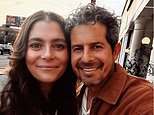'Will this be my last Christmas?' I thought to myself as a tear slid down my face while I watched my children play in the backyard.
My life had turned upside down after I was diagnosed with stage one bowel cancer in 2018. I was 38, had no family history of the disease, and few of the tell-tale symptoms doctors say you should look for.
As a nurse of 18 years, I've taken care of people on their death beds and brought them back to health. I couldn't believe I was now a patient, too. As a medical professional, you rarely expect to get sick, let alone be diagnosed with a feared disease - especially one that used to be vanishingly rare in my age group.
My symptoms could've easily been brushed aside and put down to food sensitivities or stress. For six weeks, I had bloating and stomach cramps, like so many women do. But I'd never had any bleeding, intense pain or changes in my bowel habits.
Initially, I thought I was rundown, sick or stressed from being a busy mum to a three-year-old and 18-month-old. And the symptoms, while annoying, weren't stopping me from working or going about my day-to-day life.
I know you've heard it so many times before from young people diagnosed with bowel cancer, but it's true: I was fit and healthy. I really did everything right.
Prior to having children, I trained for a half marathon and hit the gym several times a week. I never thought about illness or death and assumed I would live a long life.
In the sixth week of my persistent symptoms - the bloating and stomach cramps - I went to the doctor. I could've easily have waited to see if the symptoms worsened but because I was so health-conscious, I had a blood test - and the results were clear.
I went for a colonoscopy a month later. After the procedure, the doctor said he'd found some cells of concern.

I had to wait a whole weekend for any detailed results. It was agonising.
I was at another appointment for my two children and I noticed a missed call from my GP. I listened to her voicemail and she told me to return to the clinic.
I knew immediately. One thing I'd learned as a nurse is that doctors will never call you with good news. As soon as I walked in, she told me.
'I'm sorry, you have bowel cancer.'
Time felt like it stopped. I couldn't even think. You're unable to process anything. The word 'cancer' takes over all the space in your mind.
My boys were beside me and I didn't want to cry in front of them, so I held it together.
'What am I going to do? I have two little boys,' I said to the GP. I had to get a CT scan and more blood tests, she said matter-of-factly.
I couldn't help but think of all the possible outcomes. The worst? How long do I have left? Will this be my last Christmas? My last birthday? Will my sons grow up without me? Will I be a burden to my family?

There was no time to waste: I had surgery two weeks later to remove 30cm of my bowel along with 18 lymph nodes to test. Five days later, a miracle happened: I was told it was stage one and the cancer hadn't spread.
It was like I was given a second chance. My story is a testament to why you must stop cancer in its tracks early.
After surgery, I had a bowel dysfunction. It felt like I had gastro for months and I had no energy, in addition to fatigue and dizziness. Still, I had two children to take care of.
Christmas was different that year. I couldn't eat much. On Christmas Day, my husband and I took our boys to the beach for a barbecue - an Aussie tradition, and one our family always followed.
Part of me thought I should stay home and sit it out - but I couldn't bear the thought of leaving them behind. 'Don't take this away from me,' I thought to myself, as if I was speaking to the cancer.
Even as a nurse of 18 years, my qualifications and on-the-job training could not have prepared me for life after cancer.
Something changes in you. You're not the same person you were before, and never will be, even if you make a full recovery. My outlook on the world instantly shifted. If you've had cancer, you'll understand.
I'm still living with the fear it could return at any moment, and the surgery scars on my body are physical reminders that the risk is always there.

Returning to work after cancer
Getting ready for work after a year of recovery was a privilege, but I nonetheless felt a wave of anxiety walking into the hospital.
For the first time in my life, I was crippled with anxiety returning to a hospital. Being around patients and the clinical environment reminded me of the darkest time of my life.
Entering the main entrance, smelling the sterile smells and listening to the bustle of medical teams - it was overwhelming.
While it wasn't the same hospital where I'd had my surgery, it was still confronting. I kept reliving my own experience as I walked the hallways.
My confidence was close to zero. Being unwell for so long was disempowering. What did I have to offer? Despite this, I knew I had to push through: I knew my fears weren't rational.
Everyone was so supportive, but I could see it was hard for some people to talk about cancer.
One thing I learned after returning to work was that your cancer journey doesn't stop after treatment - or even after your five-year period of surveillance ends. Cancer is a legacy that stays with many of us, for the rest of our lives.
To add to my challenges, my young children were still waking overnight. I was exhausted, but I wanted to work. I wanted to feel useful again. I wanted to be 'good at something' again.
I worried I'd never get back to my same levels of productivity, efficiency or cognitive function. But I did. It took a year back at work until I felt more like my old self again.
My message
The truth is bowel cancer among young people is on the rise. No one knows why, although scientists have many theories. Whatever the cause, it should no longer be considered an 'old person's disease'. For me, a young and fit woman, my cancer appeared out of the blue.
The issue with bowel cancer is the symptoms are often so generalised that they aren't questioned enough. It's easily dismissed, especially among mothers who have recently given birth.
Some people make the excuse that they are 'too busy' to be vigilant with their health. But you absolutely must be. Make yourself a priority, because it could save your life.
I know there's always fear waiting for your results - but the earlier cancer is caught, the better the outcome. That weekend of waiting was hell, but I'm so glad I did it.
Listen and act when your body whispers something is wrong - before it starts screaming. It could happen to anyone, even you.
Data shows a disturbing number of young Aussies aged between 20 and 40 are being diagnosed with cancer - and the statistics are rising internationally, too.
Bowel cancer is the third most common cancer in Australia and the second leading cause of cancer death. According to research by Bowel Cancer Australia, one in nine patients are diagnosed under 50.
Doctors and scientists are yet to determine the root cause of the cancer - though health experts have considered if an unhealthy diet of processed foods, stress or anxiety come into play.
Doctor who is dedicating her career to solving mystery of colon cancer in young people reveals what could be causing explosion of cases - and the three warning signs of disease
By Cassidy Morrison, Senior Health Reporter for DailyMail.com

Dr Kimmie Ng has become a frontline witness to one of the greatest medical mysteries of her generation.
The Boston oncologist has launched one of the world's first centres dedicated to studying an explosion of cancers in young people.
In the 1990s, doctors began seeing a rise in the number of otherwise healthy people under 50 being stricken with cancer, especially colorectal cancer.
Three decades later, scientists expect the number of early-onset colon cancer sufferers will double by 2030 in what some have labelled an 'epidemic'.
Dr Ng, who specialises in gastrointestinal cancers, which also include cancers of the stomach and pancreas, said the days of cancer being a disease of the elderly was over.
'That is not what we're seeing in our clinics. Actually, these very, very young people are often very healthy,' she said.
'They're very active, exercise a lot, follow healthy diets, and they don't have a history of cancer in their family and they don't have a background of a genetic syndrome.'

This new alarming cohort don't have cancer in the family, don't smoke and drink less than previous generations.
Dr Ng said: 'Why are these otherwise healthy young people in the prime of their lives developing cancer and often very advanced stages of cancer?'
Among children ages 10 to 14 in America since 2000, colorectal cancers have increased 500 per cent and among teens aged 15 to 19 the rise was 333 per cent, even though the overall numbers of cases are still relatively low in these groups.
Dr Ng said that until doctors know more, patients under 50 must be vigilant for alarming symptoms of the cancer.
The main three signs that appear years before a diagnosis are: blood in stool, changes in bowel movements and stomach pains.
She added that fatigue and unexplained weight loss are also highly suggestive.
Junk food, plastic pollution and the overuse of antibiotics are some of the factors theorised to be behind the rise in early onset cancers, but the evidence is inconclusive.
At the Young Onset Colorectal Cancer Center at Dana-Farber Cancer Institute in Boston, Dr Ng is exploring how dozens of factors, including diet, sleep, supplementation and drinking habits are playing a role in this increase.
'I see patients one day a week and the rest of my time is spent running the [new centre], which really focuses on young people under the age of 50 who are diagnosed with colorectal cancer, as well as conducting research on the diet and lifestyle factors that may impact how long a patient lives with colorectal cancer.'

In her work, she has also discovered vitamin D levels may play a role in cancer development.
Her research showed higher levels of it in the blood was associated with longer survival in people with CRC cancer, especially in stages three and four, which suggests the vitamin plays a protective role.
But how that factors into the rise in young people is still a mystery.
So too is the apparent link between breastfeeding and colon cancer.
One 2023 study found that having been breastfed as an infant was associated with a 23 per cent increased risk of colorectal cancer later in life, and Dr Ng said this corresponded with findings from other studies she's reviewed.
But Dr Ng said this is no reason to stop breastfeeding your baby.
'We did see an association between women who reported that they were breastfed as an infant in developing polyps [in their colon], including high risk polyps before they were age 50,' she said.
'And we know that these polyps are the precursor lesion to developing colorectal cancer later on. So that association was seen and does seem pretty consistent across different studies.'
The findings indicated a need for more research into how this association holds up in larger groups over a lifetime.
'And I think, again, this really is going to be pointing back to some environmental change that's happened recently that is likely contributing to why this is happening.'
In 2010, there were 306 cases of GI cancers per capita of adults aged 20 to 29. That rose to 485 in 2019, an increase of 58 percent. For people 30 to 39, the number rose 44 percent, from 1,184 cases per capita in 2010 to 1,710 cases per capita in 2019.
But among older people, who remain the most likely to get cancer, the rate of incidence and mortality has been falling.
Dr Ng said: 'So we know overall the silver lining is that colorectal cancer has been declining... if you consider people of all ages.
And that is largely due to successes of screening programs, better adherence to screening and also improved treatments.
'But this same benefit and improvement has not been seen in people under the age of 50.
'And we do think it's probably an environmental exposure or risk factor or combination of such that is likely leading to the rise of this disease in younger people.'

She added: 'I think the take-home message is that there is an urgency to doing the research here to understanding what are the risk factors underlying this rise, what are the causes?
'And if we understood that, then we can identify the young people who are at high risk and target them for earlier screening.'
Colorectal, stomach and pancreatic cancers are among the most aggressive, especially if the diagnosis is delayed, which they often are due to how common their main symptoms are: sore stomach, nausea and changes to toilet habits.
GI cancers include those in the stomach, esophagus, colon and rectum, liver, pancreas, gall bladder, and small intestine.
Dr Ng has advocated for years for the government and doctor groups to lower the age at which screening begins in people under 45 - something that came to fruition in 2021.
And while there has been some chatter about even younger groups getting regularly tested, Dr Ng said the youngest groups still account for a small share of cases.
Approximately 150,000 patients are diagnosed each year with colorectal cancer in the U.S. About 18,000 of them are under the age of 50, Dr Ng said.
But she is raising awareness about the early warning signs.
'So the most common symptom that young patients present with is actually seeing blood in their stool. The second most common is abdominal or pelvic discomfort and a sense of bloating.
'And other red flag symptoms may include a change in your bowel habits. So new diarrhea, new constipation, a change in the caliber of the stool, including thinner pencil-thin stools.'
She added that unintentional weight loss, fatigue and shortness of breath when physically exerting oneself 'may indicate that anemia is present. Those are the most common symptoms that often lead to a diagnosis of colorectal cancer.'
Cancer is often thought of as an older person's disease. Throughout one's life, cell damage builds up and causes cells to behave differently. Sometimes, they refuse to die off or replicate beyond what is normal, contributing to a build-up of what become cancerous cells.
Thirty-three year old Alyssa Burks was diagnosed with extremely aggressive stomach cancer in 2021. Repeat lab tests and blood panels came back normal, despite her fatigue, unintentional weight loss, trouble swallowing and severe heartburn.

It wasn't until 2023 that she underwent a colonoscopy, which uncovered a cancerous polyp. It set off a domino effect of doctor's appointments, rounds of chemo, surgery to remove her stomach where the cancer had spread, and surgical removal of her reproductive organs.
After the surgery to remove her ovaries at 33, her doctor told her that her cancer was 'very angry': 'It expanded throughout my stomach and climbed further into my esophagus. It was detected in 27 lymph nodes, which indicated it metastasized to other parts of my body. I wasn't cancer-free at all - instead, I was dealing with an extremely aggressive form.'
Most recent testing showed that the cancer was still in her body, doctors just could not determine where. It's a symptom of gaps in the medical community's knowledge of how and why cancers spread so ferociously in people under 50.
She said: 'Currently, I'm in this strange position where I know I still have cancer, but it's not being treated. It feels weird to just leave it alone.
'I'm going to get a full-body scan to see where it might have spread in my body, but imaging tests aren't great at picking up my type of cancer. Still, I'm hoping it will give me some answers so that I can press my team for other treatment before it gets worse.'
Cases of colorectal cancers in young people are expected to double by 2030. And while obesity – which affects 42 per cent of Americans – is a driving factor of CRC and other cancers, it cannot be the sole explanation.
Dr Andrea Cercek, an oncologist at Memorial Sloan Kettering Cancer Center, said: 'The rise in obesity alone does not explain the growth of GI cancers in younger people.
'We are also looking at other possible factors, including toxins we may be ingesting in our food, like hormones, or changes caused by antibiotics to the microbiome in our bodies, which are bacteria and other microbes that help us digest our food. All of these and more are being investigated.'
Scientists have recently begun to focus on forever chemicals, including microplastics, which have penetrated the bodies of 97 per cent of Americans, as a driving force.
The chemicals devised by home goods giant 3M in the 1940s are extremely persistent in the environment and the human body, taking months or even years to break down.
Studies have suggested these chemicals can cause widespread inflammation in bodily tissues, high blood pressure, hormone interference, thyroid disease, high cholesterol and a weakened immune system.
All of this raises the risk of developing a wide array of cancers beyond just gastrointestinal, including ovarian, kidney, breast and testicular cancers.
Cancers that have spread beyond organs in the GI tract are far more likely to be fatal.
Late-stage colon cancer has a five-year survival rate of about 13 per cent, and that of rectum cancer is 18 per cent.
Pancreatic cancer that has spread, meanwhile, has a survival rate of about 15 per cent.
Dr Ng said thanks in part to her pioneering research, the future in medical advancements looks bright: 'The hope in science is limitless and it has resulted in discoveries that have changed the way patients are treated and that has more than doubled the survival of patients with colorectal cancer.
'There are advances being made every day. The longer you are around, and thriving on treatment, the more new advances will be made.'












